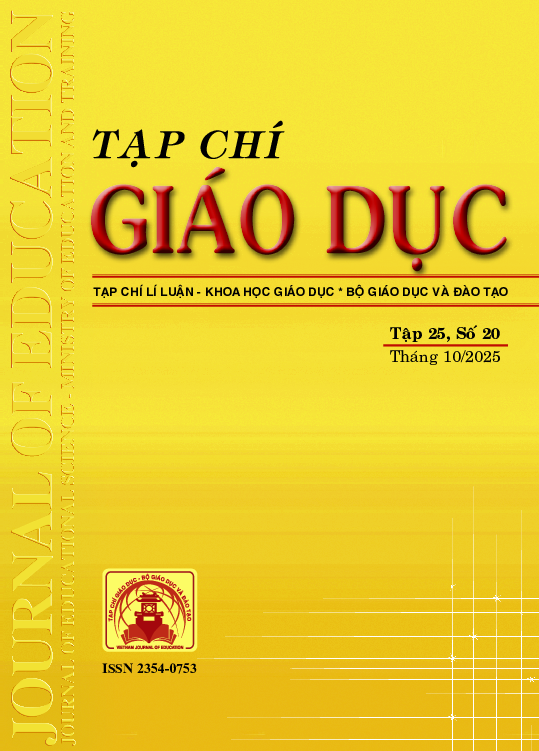Mối quan hệ giữa năng lực cảm xúc - xã hội và cảm nhận hạnh phúc của sinh viên: nghiên cứu tại Trường Đại học Văn Lang
Tóm tắt
Contemporary university education is increasingly focusing on the comprehensive development of learners' capacities, especially soft skills that contribute to shaping the quality of life. This study investigates the relationship between social-emotional competence and university students’ perceived happiness within the context of higher education. Employing a cross-sectional survey design, data were collected from a sample of 396 students at Van Lang University using measurement scales that have been validated for reliability in Vietnam. The data were analyzed through descriptive statistics, Pearson correlation, and linear regression analysis. The findings reveal that social-emotional competence is positively and significantly associated with students’ well-being. Notably, the dimensions of Self-Awareness and Responsible Decision-Making emerge as the strongest predictors. The study offers a deeper understanding of the role of socialemotional competence in promoting students’ well-being and practical implications for embedding social-emotional learning into undergraduate programs.
Tài liệu tham khảo
Butler, J., & Kern, M. L. (2016). The PERMA-Profiler: A brief multidimensional measure of flourishing. International Journal of Wellbeing, 6(3), 1-48. https://doi.org/10.5502/ijw.v6i3.526
CASEL - Collaborative for Academic, Social, and Emotional Learning (2020). CASEL’S SEL Framework: What Are the Core Competence Areas and Where Are They Promoted?. https://casel.org/casel-sel-framework-11-2020/
Đặng Thị Kim Ánh, Trịnh Phương Thảo (2024). Cảm nhận hạnh phúc của sinh viên: Nghiên cứu tại một số trường đại học ở Thành phố Hồ Chí Minh. Tạp chí Giáo dục, 24(13), 53-58.
Đinh Thị Thi, Lê Thái Phượng (2021). Đo lường cảm nhận hạnh phúc của sinh viên tại các tường đại học trên địa bàn thành phố Đà Nẵng, Việt Nam. Tạp chí Khoa học và Công nghệ, Đại học Thái Nguyên, 226(18), 288-295.
Đinh Thị Thi, Lê Thái Phượng (2022). Các nhân tố ảnh hưởng đến cảm nhận hạnh phúc của sinh viên - Nghiên cứu tại Trường Đại học Kiến trúc Đà Nẵng. Tạp chí Khoa học và Công nghệ, Đại học Thái Nguyên, 227(12), 34-44.
Hồ Văn Dũng (2022). Cảm nhận hạnh phúc của sinh viên Trường Đại học Sư phạm - Đại học Huế. Tạp chí Giáo dục, 22(3), 59-64.
Hoàng Thu Huyền (2023). Năng lực cảm xúc xã hội của sinh viên đại học ngành Giáo dục mầm non. Tạp chí Khoa học Giáo dục Việt Nam, 19(S3), 15-23.
Jiang, Y., Lu, C., Chen, J., Miao, Y., Li, Y., & Deng, Q. (2022). Happiness in university students: Personal, familial, and social factors: A cross-sectional questionnaire survey. International Journal of Environmental Research and Public Health, 19(8), 4713.
Jin, R. J., Songsiengchai, S., & Yang, F. (2025). The Impact of Social-Emotional Learning (SEL) on the Mental Health Land Well-Being of Students at Henan University. International Journal of Education and Literacy Studies, 13(2), 666-674.
Jones, S. M., & Bouffard, S. M. (2012). Social and emotional learning in schools: From programs to strategies and commentaries. Social Policy Report, 26(4), 1-33. https://doi.org/10.1002/j.2379-3988.2012.tb00073.x
Kaşıkcı, F., & Özhan, M. B. (2021). Prediction of academic achievement and happiness in middle school students: The role of social-emotional learning skills. Inquiry in Education, 13(2), Article 15. https://digitalcommons.nl.edu/ie/vol13/iss2/15
Nguyễn Mai Đức Mạnh, Nguyễn Huỳnh Minh Phúc (2024). Chỉ số hạnh phúc của sinh viên Trường Đại học Khoa học Xã hội và Nhân văn, Đại học Quốc gia Thành phố Hồ Chí Minh. Tạp chí Khoa học và Công nghệ, Đại học Thái Nguyên, 229(03), 395-402.
Nguyễn Thị Minh Phương (2023). Một số yếu tố liên quan đến cảm nhận hạnh phúc của sinh viên ngành Y khoa năm thứ ba Trường Đại học Y Dược Thái Bình năm học 2020-2021. Tạp chí Y Dược Thái Bình, 7, 95-99.
Seligman, M. E. P. (2011). Flourish: A visionary new understanding of happiness and well-being. New York, NY: Free Press.
Simion, A. (2023). The impact of socio-emotional learning (SEL) on academic evaluation in higher education. Educatia 21, 24, 109-117.
Thongsri, N., Seksan, J., & Warintarawej, P. (2024). Factors Affecting the Happiness of Learners in Higher Education: Attitude, Grade Point Average, and Time Management. Sustainability, 16(18), 8214.
Trần Thị Tâm Minh (2024). Giáo dục cảm xúc xã hội cho trẻ mầm non thông qua hoạt động phát triển nhận thức. Tạp chí Khoa học, Trường Đại học Đồng Tháp, 13(6), 11-15. https://doi.org/10.52714/dthu.13.6.2024.1269
Trần Thị Tú Anh, Đinh Thị Hồng Vân, Nguyễn Phước Cát Tường, Đậu Minh Long (2019). Thực trạng năng lực cảm xúc - xã hội của lứa tuổi vị thành niên. Tạp chí Khoa học Giáo dục Việt Nam, 21, 39-43.
Trần Thị Tú Anh, Trần Thị Thuý (2017). Phát triển năng lực cảm xúc - xã hội cho học sinh lớp 3 thông qua dạy học môn Tiếng Việt. Tạp chí Khoa học và Giáo dục, Trường Đại học Sư phạm - Đại học Huế, 04(44), 72-81.
Weissberg, R. P., & Cascarino, J. (2013). Academic Learning + Social-Emotional Learning = National Priority. The Phi Delta Kappan, 95(2), 8-13. https://doi.org/10.1177/003172171309500203
Zhou, M., & Ee, J. (2012). Development and validation of the Social Emotional Competence Questionnaire (SECQ). The International Journal of Emotional Education, 2, 27-42.
Tải xuống
Đã Xuất bản
Cách trích dẫn
Số
Chuyên mục
Giấy phép

Tác phẩm này được cấp phép theo Ghi nhận tác giả của Creative Commons Giấy phép quốc tế 4.0 .












